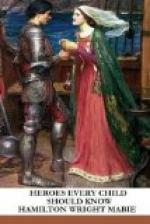Now, as time passed, King Arthur gathered into his Order of the Round Table knights whose peers shall never be found in any age; and foremost amongst them all was Sir Launcelot du Lac. Such was his strength that none against whom he laid lance in rest could keep the saddle, and no shield was proof against his sword dint; but for his courtesy even more than for his courage and strength, Sir Launcelot was famed far and near. Gentle he was and ever the first to rejoice in the renown of another; and in the jousts, he would avoid encounter with the young and untried knight, letting him pass to gain glory if he might.
It would take a great book to record all the famous deeds of Sir Launcelot, and all his adventures. He was of Gaul, for his father, King Ban, ruled over Benwick; he was named Launcelot du Lac by the Lady of the Lake who reared him when his mother died. Early he won renown; then, when there was peace in his own land, he passed into Britain, to Arthur’s Court, where the King received him gladly, and made him Knight of the Round Table and took him for his trustiest friend. And so it was that, when Guenevere was to be brought to Canterbury, to be married to the King, Launcelot was chief of the knights sent to wait upon her, and of this came the sorrow of later days. For, from the moment he saw her, Sir Launcelot loved Guenevere, for her sake remaining wifeless all his days, and in all things being her faithful knight. But busy-bodies and mischief-makers spoke evil of Sir Launcelot and the Queen, and from their talk came the undoing of the King and the downfall of his great work. But that was after long years, and after many true knights had lived their lives, honouring the King and Queen, and doing great deeds.
Before Merlin passed from the world of men, he had uttered many marvellous prophesies, and one that boded ill to King Arthur; for he foretold that, in the days to come, a son of Arthur’s sister should stir up bitter war against the King, and at last a great battle should be fought, when many a brave knight should find his doom.
Now, among the nephews of Arthur, was one most dishonourable; his name was Mordred. No knightly deed had he ever done, and he hated to hear the good report of others because he himself was a coward and envious. But of all the Round Table there was none that Mordred hated more than Sir Launcelot du Lac, whom all true knights held in most honour; and not the less did Mordred hate Launcelot that he was the knight whom Queen Guenevere had in most esteem. So, at last, his jealous rage passing all bounds, he spoke evil of the Queen and of Launcelot, saying that they were traitors to the King. Now Sir Gawain and Sir Gareth, Mordred’s brothers, refused to give ear to these slanders, holding that Sir Launcelot, in his knightly service of the Queen, did honour to King Arthur also; but by ill-fortune another brother, Sir Agravaine, had ill-will to the Queen, and professed to believe Mordred’s evil tales. So the two went to King Arthur with their ill stories.




